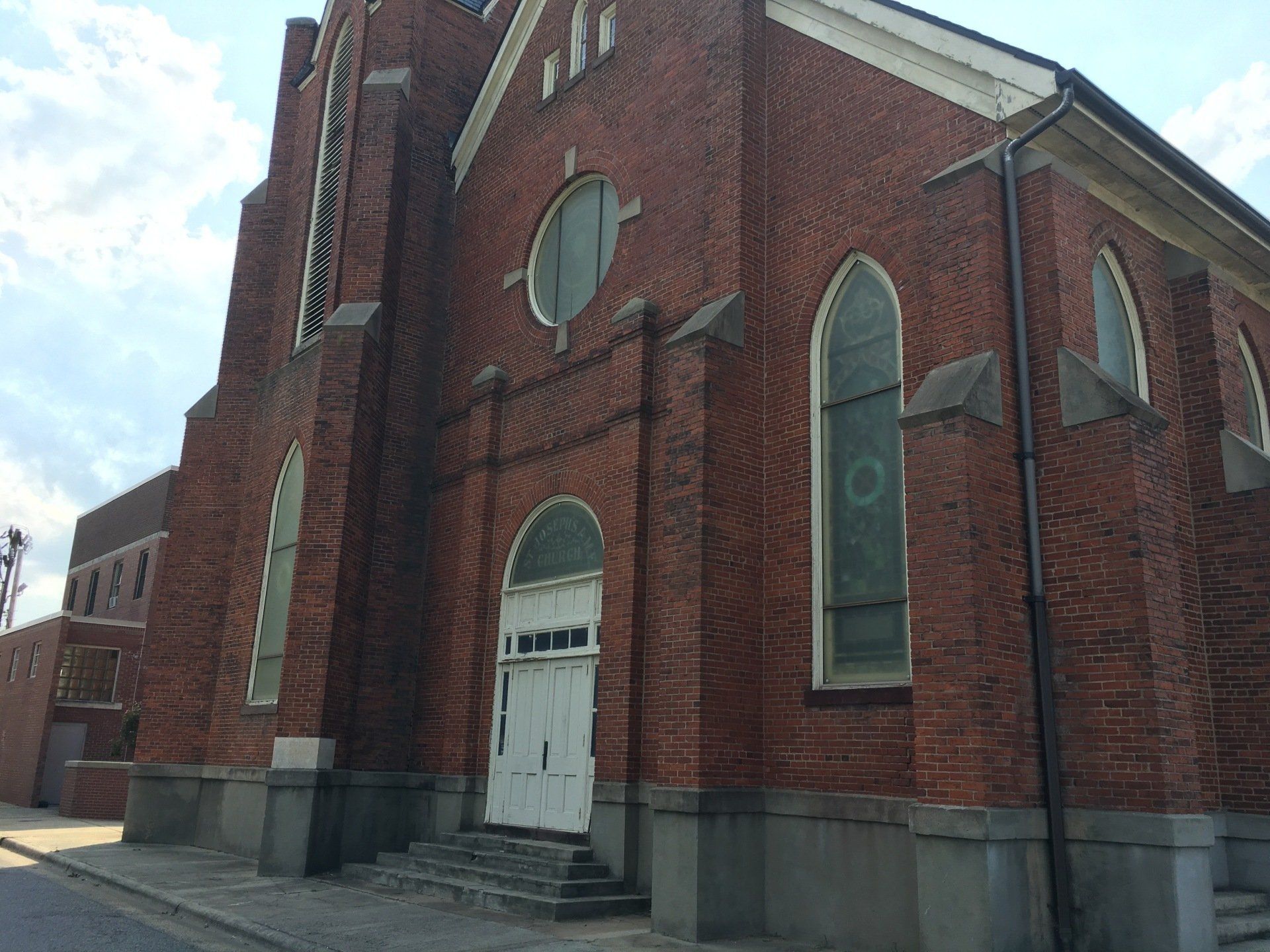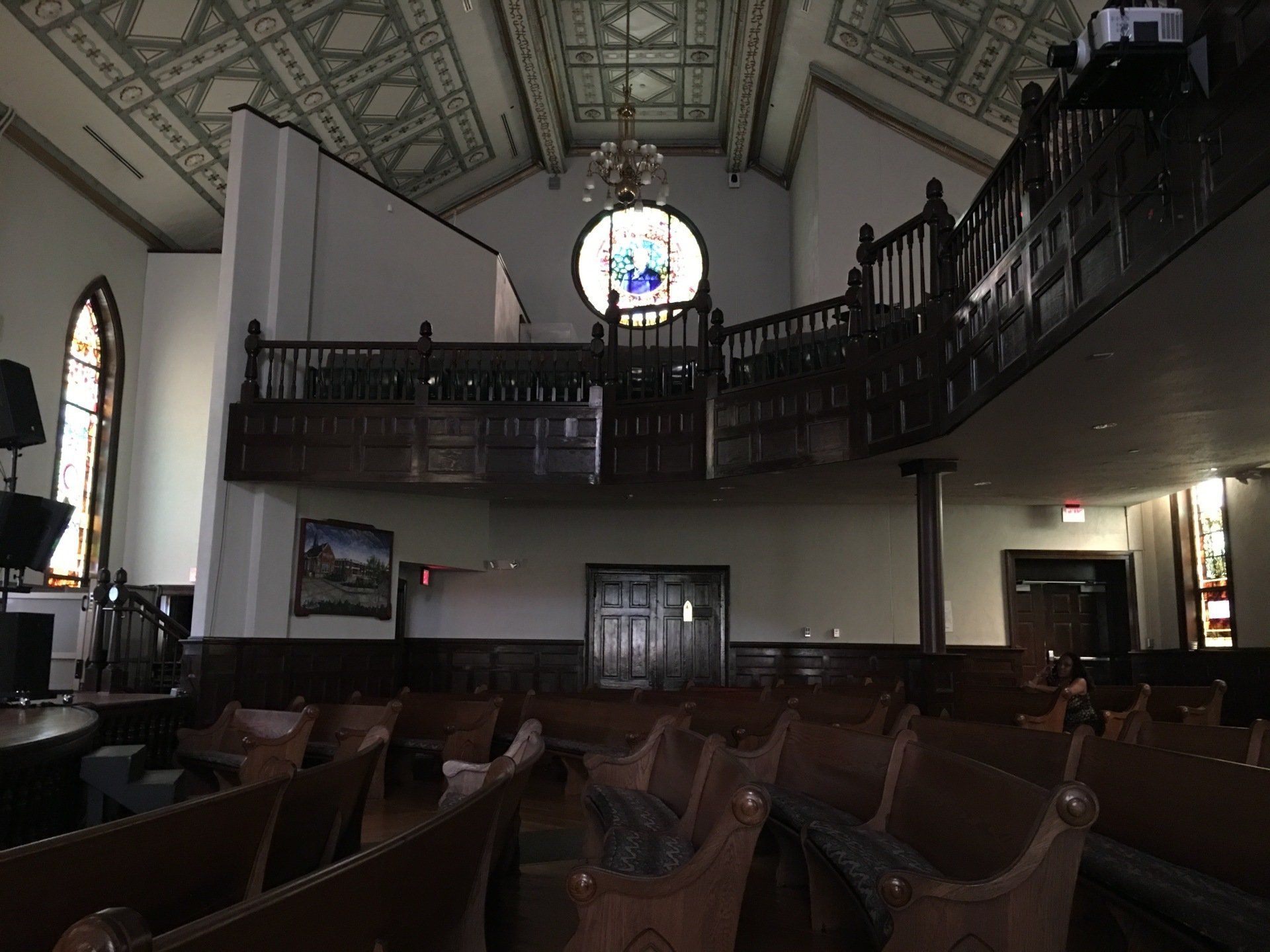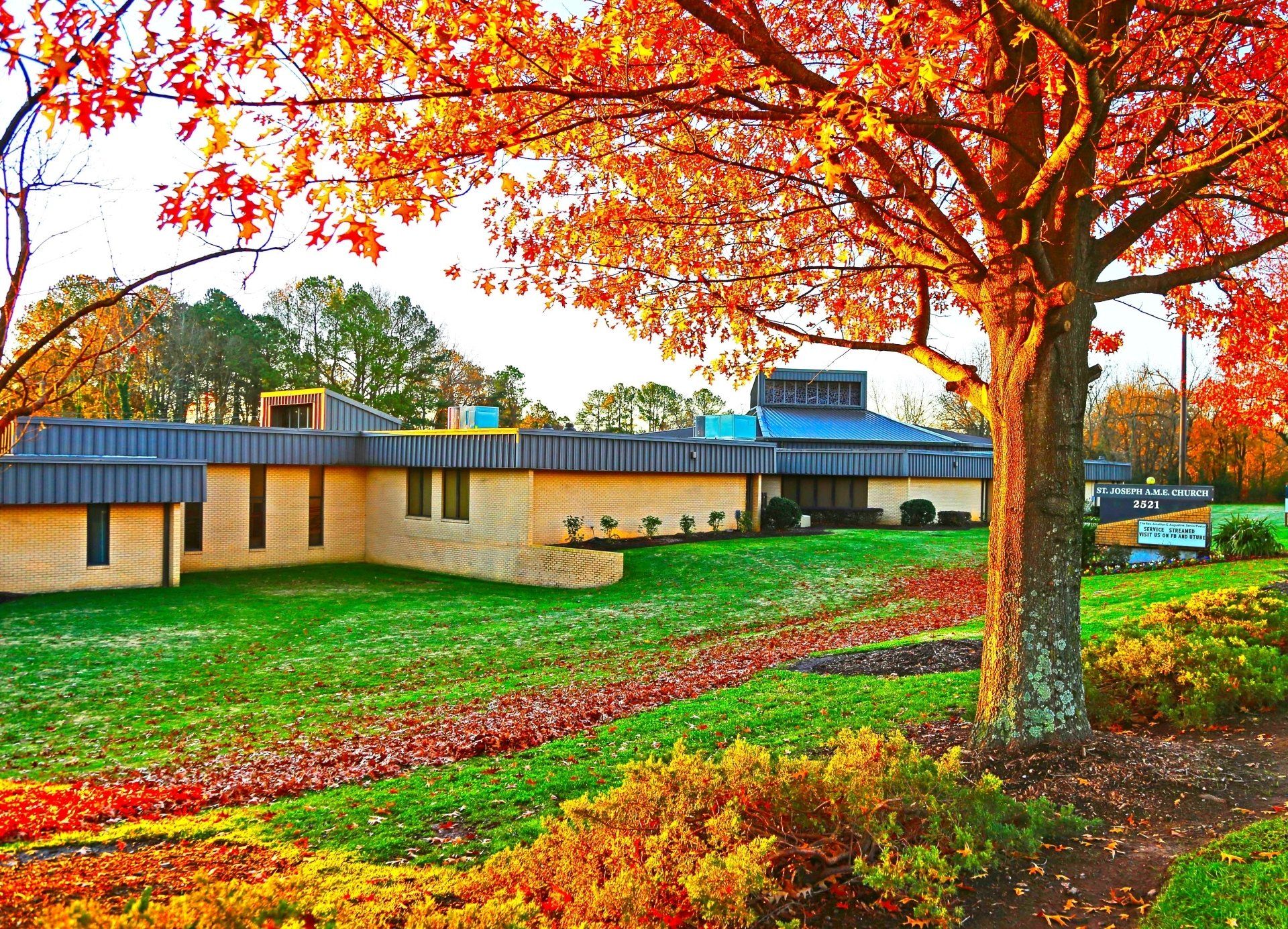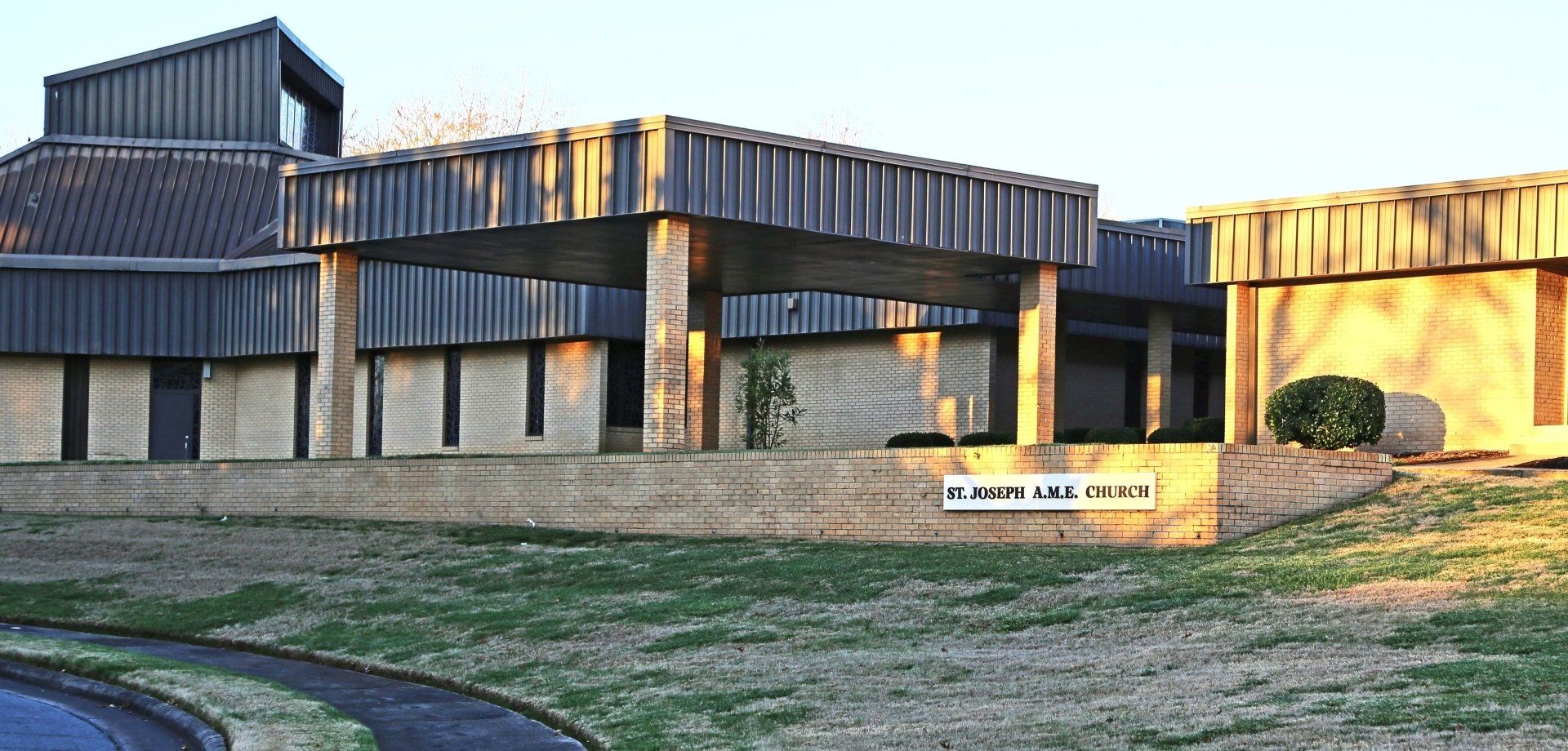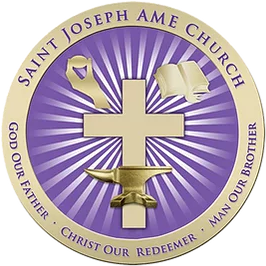ABOUT
Our Church History
The History of St. Joseph African Methodist Episcopal Church155 Years of Excellence!
The history of Saint Joseph African Methodist Episcopal Church reflects legacies of spiritual dedication, diligence in service, and unity of purpose. St. Joseph’s founder, the Reverend Edian D. Markum (later, Markham)
was born in Elizabeth City, North Carolina on April 23, 1824. In 1868, Rev. Markham and his wife, Sister Molly Markham, came to Durham and purchased a parcel of land from Mrs. Minerva Fowler. They used it for preaching and holding prayer meetings. Historians report that “the newly found church was nothing more than bushes supported by long poles which were fixed in the ground, with God’s ‘grassy earth’ as the floor.”
Shortly thereafter, a log cabin was constructed in which Rev. Markham continued to preach and teach the doctrine of the African Methodist Episcopal Church. On August 20, 1869, the congregation, with its six members, were officially organized under the name Union Bethel A.M.E. Church. Rev. Markham’s wife, Sis. Markham, worked diligently with her husband and placed special emphasis on missionary endeavors until her death in February 1941. When the congregation’s membership reached fifteen, Rev. Markham was transferred to another pastorate and succeeded by the Reverends Lewis Edwards and George Hunter, respectively.
Rev. Hunter accepted the challenge of initiating the construction of the first frame church building. It was subsequently replaced by a more stable frame edifice. After Rev. Hunter’s service, the second frame building was completed by the Reverends O. Ofley, L. Edwards, and W. D. Cook. As the congregation’s membership continued to increase, the pastor, officers and members developed plans for a “more stately” brick structure. The cornerstone was laid for the facility in 1892, at 804 Fayetteville Street, with the Reverend Andrew Chambers
as pastor. Soon the name of the church formally changed to Saint Joseph African Methodist Episcopal Church
(St. Joseph). The building program continued under a succession of pastors, including the Reverends W. J. Jordan, W.E. Walker, D.J. Beckett and J.E. Jackson, who shepherded the church’s completion. The bricks used in construction were obtained from Robert Fitzgerald and Sons, an African American company. Church records show that church members and prominent community leaders made generous financial contributions. Key among them were Brother John Merrick, a church trustee and co-Founder of the North Carolina Mutual Life Insurance Company; Professor W.G. Pearson, a trustee and school principal; Sister Minnie S. Pearson, a missionary leader; Brother John Avery, a connectional lay leader; and Brother E.D. Mickle, an outstanding steward. Washington Duke, General Julian Carr, W.T. Blackwell
and Eugene Morehead
were among the white Durham citizens whose financial contributions assisted with the building program, and the maintenance of the new facility. Their names were embossed on the edifice’s stained-glass windows. The church’s basement was completed to street level during the administration of the Reverend J.A. Valentine.
St. Joseph’s membership made rapid gains in the 20th century. On November 28, 1948, the Reverend David A. Johnston
and his wife, Sister Verdelle Johnston, along with their daughter, Doris, arrived at St. Joseph. Rev. Johnston was a visionary leader. During his tenure, St. Joseph planned and expanded its facility to include the construction and dedication of the Edian D. Markham Memorial Educational Building, along with a new parsonage. The sanctuary was renovated, exterior painted, and the structure’s bricks were restored to their original beauty. The Official Board endorsed the naming of the education building, as a tribute to St. Joseph’s founder, on March 17, 1952. After its completion, Rev. Johnston established a nursery school and first grade. He also expanded his family by welcoming another daughter, Loretta.
Rev. Johnston was succeeded in 1958, by the Reverend Melvin Chester Swann
and his wife, Dorothy. Under Rev. Swann’s leadership, St. Joseph’s Lay Organization was established in 1964.
In September of 1965, the Reverend Dr. Philip R. Cousin, Sr., his wife, Margaret Joan, and their sons, came to St. Joseph. Rev. Cousin was a young, assertive minister with progressive ideas. These resulted in the establishment of new programs and building plans. A new parsonage was constructed in October 1968, and seven acres of land at the corner of Fayetteville Street and Burlington Avenue was secured for a new facility, with a dedication service held in 1974. Immediately thereafter, Mr. Clinton Gravely, an African American architect from Greensboro, North Carolina, was engaged to design a new church edifice. Male and female designers selected the color scheme, and the cornerstone was laid in October 1975. A historic milestone then occurred, on February 15, 1976, as the congregation marched from 804 Fayetteville Street (the old site) to 2521 Fayetteville Street (the current site) for its grand opening. The new facility was dedicated on April 11, 1976.
While the membership celebrated the construction of the “new” St. Joseph, they also recognized the historic value and civic contribution of the original site gave the Durham community. Consequently, the site was repurposed as a cultural enrichment and arts education facility and renamed the Hayti Heritage Center. The year 1976 also marked another milestone in St. Joseph’s rich history. During June 1976, Rev. Cousin was elected the 96th Bishop of the African Methodist Episcopal Church
at the Fortieth Session of the General Conference in Atlanta, Georgia. He is the first Bishop elected from St. Joseph and first A.M.E. Bishop from the State of North Carolina.
On August 15, 1976, Bishop Henry W. Murph
appointed Reverend William Webster Easley, Jr.
as St. Joseph’s pastor. He was accompanied by his wife, Ora, and their son. During Rev. Easly’s tenure, the congregation continued to grow numerically and programmatically. A new Reuter pipe organ was installed and paid for, the parsonage’s mortgage was paid-off, and the Sarah Allen Missionary Unit was formed. Rev. Easley served as St. Joseph’s pastor for 16-years.
On August 16, 1992, Pastor Easley was succeeded by the Reverend Philip R. Cousin, Jr.,
the eldest son of St. Joseph’s former leadership team, Bishop and Mrs. Philip R. Cousin, Sr. Under his guidance, the congregation initiated a van ministry, refurbished the church’s offices and rooms, purchased new office equipment, completed a total renovation of the parsonage, and instituted an aggressive plan to liquidate the church mortgage. Four years later, In 1996, the mortgage—which had been in excess of $400,000.00—was burned. Under Rev. Cousin’s leadership, St. Joseph also received its first female members of the Board of Stewards. Included among the new appointees were Sisters Cora Bryant, Ava Haskins Brownlee, Azzie Conley, Emily Marshall, and Natalie Perkins. Rev. Cousin’s service at St. Joseph spanned 21-years.
On June 16, 2013, the Reverend Dr. Ronald L. Owens
was appointed to serve as St. Joseph’s pastor. Rev. Owens, along with his wife, Gwendolyn, and daughter Ronnise, embraced the church’s rich history and progressively implemented a new twenty-first-century vision, and commitment to the church family and community. Notably, Rev. and Mrs. Owens initiated a progressive community outreach ministry, instituted programs and resource networks for seniors, and established a college connection ministry with students at North Carolina Central University (NCCU).
On May 4, 2019, at the conclusion of the Western North Carolina Annual Conference, Bishop James Levert Davis
appointed the Reverend Dr. Jonathan C. Augustine
as St. Joseph’s 31st Pastor. Rev. Augustine and his wife, Sister Michelle, along with their children, Mason and Jillian, were officially welcomed on Sunday, May 5, 2019. Since then, “Pastor Jay” has continued to collaborate with NCCU, establishing #NCCUSundays
as days of philanthropic support for scholarships, while also emerging as a prophetic voice in Durham, and around the United States, as he instituted #SocialJusticeSundays. The high-profile quarterly events have honored and welcomed, the Royal Ice Cream Seven, of the 1957 Durham sit-in, Vice President Kamala Harris (then a member of the United States Senate), the Honorable Andrew J. Young, the Reverend Dr. William J. Barber, II, and Marc H. Morial,
president & CEO of the National Urban League, among others. Pastor Jay led St. Joseph through an exciting and spirit-filled, “150-days for 150-years,” as St. Joseph celebrated its 150th Anniversary. With innovation and creativity, new ministries were born under Pastor Jay’s leadership, with significant technology upgrades and installation of a marquee digital sign, as the congregation experienced significant growth. As St. Joseph also responded to the COVID-19 Pandemic, Pastor Jay led the church’s transition into a thriving virtual space, ministering to people around the world. One of the books he authored while serving St. Joseph, When Prophets Preach: Leadership and the Politics of the Pulpit
(Fortress Press, 2023), discusses St. Joseph’s social justice leadership in Durham and beyond. He calls St. Joseph “The best church this side of Heaven.”
St. Joseph’s historic pastoral leadership has been complemented by the rich engagement of its members. Since the early 1900’s, members have held leadership positions throughout the A.M.E. Church, including Brother John Avery, a lay leader, and Sister Minnie S. Pearson, a missionary leader. Following these early pioneers were others who made significant contributions to the connectional church. Notably, Attorney William A. Marsh, Jr.
was elected, in 1976, as a member of the Judicial Council of the A.M.E. Church at the General Conference in Atlanta, Ga. Subsequently in 1992, he became the chief counsel and in 1999, the General Counsel of the African Methodist Episcopal Church. Between 1960-1988, Sister Verdelle Johnston
served as president of the Western North Carolina Conference Branch of the Women’s Missionary Society; chairman of Promotion and Missionary Education for the Western North Carolina Conference; connectional historiographer of the Women’s Missionary Society; chairman of Promotion and Missionary Education for the Second Episcopal District, and was appointed, by Bishop H. Hartford Brookins, as supervisor of the Second Episcopal District. During her tenure, Sister Johnston also authored the seminal text of the history of the Women’s Missionary Society, One Hundred Years of Victorious Service.
Further, Sister Willia R. George
was appointed by Bishop John Hurst Adams
and Dr. Dolly Desselle Adams
as connectional chair of the Hughes-Smith Life Membership Committee of the Women’s Missionary Society (1987-1995). The connectional WMS established the Endowment Fund of which Sis. George served as the first chairperson. In 2016, she received a Living Legacy Award from the Western District Community Development Corporation. Earlier, Sister Claudine Zimmerman
was elected as Conference director of the Young People’s Division of the WMS and, in 2018, Sister Florine Roberson
received The Western District’s Community Development Corporation Living Legacy Award.
St. Joseph’s history also includes members who have held leadership in the Western North Carolina Conference (WNCC). Sister Minerva Evans, Dr. James W. Hill, Sr.
and Sister Mary Dasher McAdams
served as presidents, and Dr. Robert McAdams
served as treasurer of the WNCC Lay Organization. St. Joseph member, Shontea Smith
(now a pastor), was elected to serve as historian for the Richard Allen Young Adult Council (RAYAC) in 2014. The following year, in 2015, her peers also elected her to serve as secretary for RAYAC of the Second Episcopal District.
Sister Azzie Conley
was elected a delegate of the WNCC to the 50th Quadrennial Session of the General Conference of the African Methodist Episcopal Church. She was also elected as the conference delegate of the WNCC Lay Organization to the 35th Biennial Session of the connectional Lay Organization in 2017. She has represented St. Joseph as a delegate of the WNCC Branch of the Women’s Missionary Society, as a member of the Second Episcopal District delegation to the WMS Quadrennial Convention, and as a WNNC delegate to the 51st and 52nd Quadrennial Sessions of the General Conference, in 2021 and 2024, respectively, representing the Second Episcopal District as a member of the Episcopal Committee. Significantly, she is also St. Joseph’s first female treasurer.
St. Joseph was also represented at the connectional level by Brother Adam Johnston
who was elected as the Youth Delegate of the WNCC to the Fiftieth Quadrennial Session of the General Conference of the African Methodist Episcopal Church. In 2017, he was elected by the WNCC Lay Organization as delegate to the Thirty-Fifth Biennial Session of the Connectional Lay Organization and, in 2018, he was elected as the second vice president of the WNCC Lay Organization. Additionally, Brother Johnston was elected as the Young Adult Representative for the Second Episcopal District Lay Organization. Most recently, St. Joseph’s current pastor, the Reverend Dr. Jonathan C. Augustine, was elected as a clergy member of the A.M.E Church Judicial Council, during the 51st General Conference, in 2021. His colleagues elected him vice president of the Judicial Council in 2024, at the 52nd General Conference.
St. Joseph continues to make significant contributions to the community, in politics and education. Of particular note, Sister Anita Earls
serves as an associate justice on the North Carolina Supreme Court; Brother Stephen Valentine
serves as a Durham County commissioner; Sister Jovonia Thomas Lewis
served as a member of the Durham Public Schools Board of Education; and Pastor Augustine served, after appointment by North Carolina Governor Roy Cooper,
on the state’s Andrea Harris Social, Economic, Environmental and Health Equity Task Force, in the wake of the COVID-19 Pandemic. St. Joseph’s pastors have also played roles in serving as mentors and providing apprenticeship opportunities for Duke Divinity School
students. Further, in keeping with the entrepreneurial spirit of Bishop Richard Allen, founder of the A.M.E Church, and the Reverend Edian Markham, St. Joseph’s founder, the congregation owns several properties that serve the Durham community.
